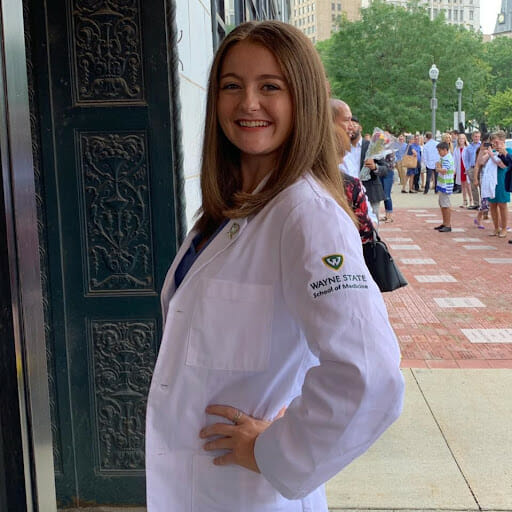What Is a First-Generation Medical Student?
A first-generation medical student is an individual who is the first member of their family to attend medical school.
Why Is “First-Generation Medical Student” a Term?
Being the first for anything is often a noble pursuit, but it also comes with its own unique challenges — and attending medical school is no exception.
Influence from family
First, it is often the case that individuals are inspired to pursue a career that their family members are involved in. Eldest children often take over family businesses, or follow in their parent’s footsteps and find work or pursue education in the same field.
In these cases, family members often serve as the first mentors to help the individual onto a path of success. In medicine and other fields that require an advanced degree, this mentorship may start very young. The parents’ education level has been tied to childhood and adulthood academic and financial success. This is likely due to a multitude of ways in which highly-educated parents interact with their children, from reading to them at a young age to prioritizing academics and helping with homework. If parents are unable to help with academics directly, physician parents are likely to have money and resources to ensure their children succeed in school. Academic success is particularly important for those pursuing a career in medicine, as it continues to become more and more competitive to become accepted into medical school each year.
Following in someone’s footsteps
Additionally, those with family members in medicine have had someone before them “pave the way”. They are familiar with the process of becoming a physician from start to finish and can give tips based on their experience. Starting out as a pre-medical student can be difficult — trying to form connections and find shadowing or volunteering opportunities in a competitive field.
However, if your uncle is a physician, you may be able to shadow him. If your mother is on the faculty at a medical school, she can help you prepare your medical school application so that you are successful.
The medical school application process is notoriously nebulous, especially when it comes to what is required for consideration of acceptance. Many medical schools have very sparse requirements, like minimum grade point average and a number of letters of recommendation.
Connections
However, most medical schools are looking for well-rounded applicants, with clinical experience, volunteer experience, and varied life experiences. Though these items aren’t listed on medical school websites, those that have been through the process are able to help their family members navigate the application cycle and acquire valuable experiences that will impress medical school admission committees. They also often have connections that can help their loved one get started on building their resume soon after they decide on pursuing a career in medicine.
As a first-generation medical student, my freshman year of college was the time when I first noticed the disadvantage I had.
Many of my pre-med colleagues had established connections with physicians through their family members in medicine, and had started shadowing and building their resume. Meanwhile, I was trying to find volunteer opportunities and clinical experiences through emails and job fairs. I felt lost regarding who to ask questions of, and where to start to get on the right track.
What Is the Lived Experience of a First-Generation Medical Student?
I struggled to get started as a first-generation medical student. Thankfully, through trial and error, I met the right people and had the experiences I needed to get into medical school. Here are some tips based on what has helped me in my journey to medicine:
1. Take advantage of your resources early and often.
Once you have decided to pursue a career in medicine, contact your school’s guidance counselor. Many universities even have counselors specific for pre-medical or pre-professional students that can give more tailored advice. There are often pre-medical clubs that have information on volunteering opportunities and board prep materials. The alumni network can also be a valuable resource to connect you with physicians who may allow you to shadow them.
2. Learn from those you look up to and recruit a variety of mentors.
If you have a professor that inspires you, talk to them about your career goals and try your best to work with them in some way. They may be involved in research that you could participate in, or have an upcoming course in search of student instructors. Building working relationships with your professors will be incredibly helpful when it comes time to ask for letters of recommendation for your medical school application.
I used to operate under a false assumption (and subsequently, a lofty goal) that I was in search of one mentor. I then felt embarrassed that I was having difficulty finding this fantastical person.
I’m not sure where this notion originated, but I’m sharing it in case it resonates with anyone reading. Then I realized that I have had many mentors on my path to medicine. There was my biology professor, who taught me how to teach science to others; the first physician I shadowed, who taught me about the importance of patient-physician rapport; and the ER doctor I worked with, who took time to teach me about medicine while I was working as a medical scribe (P.S. I think working as a medical scribe is the most valuable experience a pre-medical student could dream of!). Especially if you are a first-generation medical student, you will have many mentors that guide you to and through medical school, who will help shape you as a physician. Although there is not one person with all the answers, the people you meet on your path will help you come up with the answers that are right for you.
3. Find a friend (or two) with similar career goals.
Talk to your classmates between classes or at club meetings, and make friends with a few peers who are also pre-med. Not only can you form a study group and help each other succeed academically, but you can also participate in the same extracurriculars and support one another when times are tough (especially during finals).
4. Don’t be afraid to ask for help.
It can be difficult to ask for help for many reasons, but please know that there are people that want to help you. As a first-generation medical student, I am incredibly grateful for those who have helped me along the way, and I have every intention of serving as a mentor for those who come after me. There will be people in your corner who are willing to help you succeed, you just have to put yourself out there and find them.
5. Believe in yourself!
Deciding to pursue a medical degree can be intimidating. There will be a long road ahead of you, but you have already made it this far. Take time to celebrate your accomplishments before focusing on all that you still have to do. Keep showing up, trying your best, and believing you have what it takes to succeed.
What Changes Need to Be Made to “Level the Playing Field” for First-Generation Medical Students?
The experiences of individuals who grow up with a role model in medicine could never be duplicated, so there will likely always be an inherent advantage for those who are not first-generation medical students. However, in order to begin to level the playing field for first-generation medical students, resources for pre-medical students need to be made available early. In particular, with an emphasis on finding volunteer opportunities (both in and out of clinical settings) and finding mentors. I look forward to providing mentorship to other first-generation (hopeful) medical students once I have completed my training.




